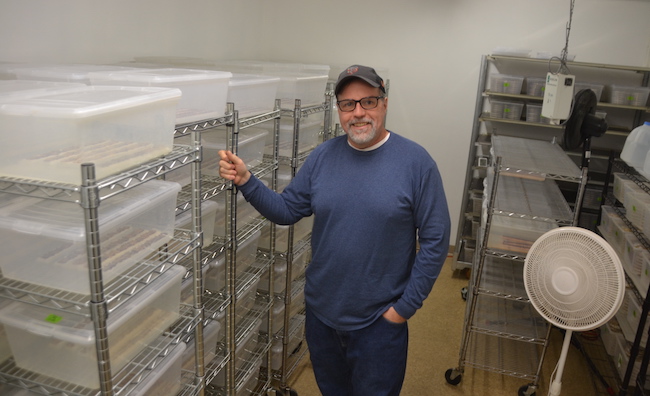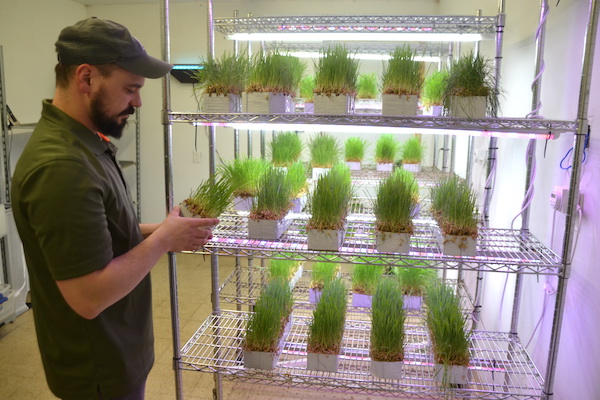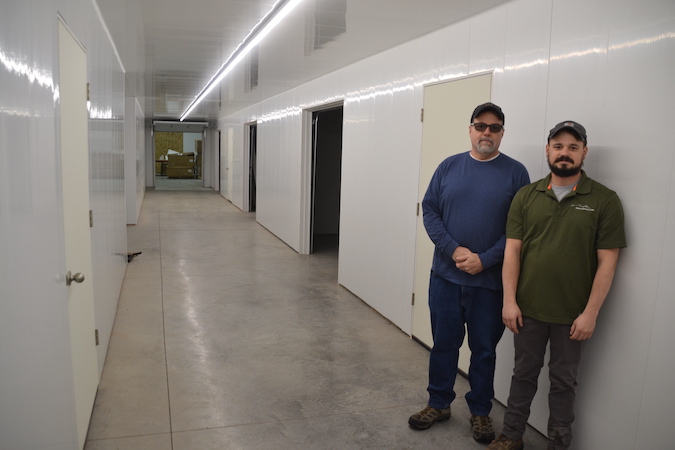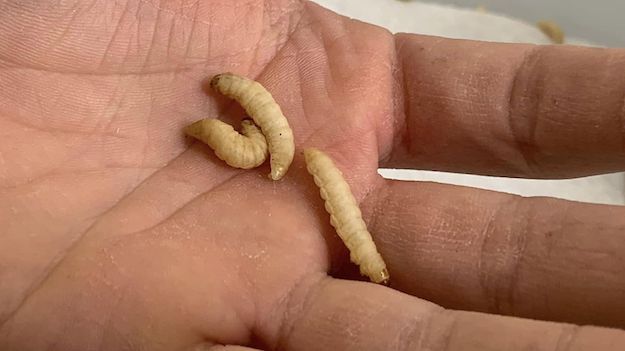Company in Ridgeway that uses bugs to control plant pests is expanding
Sierra Biological has new building, growing workforce

Photos by Tom Rivers: Casey Decker recently sold his company, Sierra Biological, to Beneficial Insectary. Decker will stay on as leader of Sierra Biological on Swett Road in Ridgeway. The company distributes nematodes and other insects to control pests that can damage or destroy plants that produce vegetables, flowers, fruits and cannabis.
RIDGEWAY – A company on Swett Road in Ridgeway has built an army of tiny insects that are used for pest control to help farmers and greenhouse operators produce crops – flowers, fruits, vegetables and cannabis.
Sierra Biological moved its operations to Ridgeway in May 2016. Casey Decker, the company’s CEO, founded the company in California. He was operating it in an out building at his home with his wife Nina.
They needed more room for the business. But real estate is very expensive in California. Decker had a big client at a greenhouse in Canada just over the border from Western New York. He also had a customer in Buffalo.
Decker scouted sites in WNY and settled on a former collision shop on Swett Road in Ridgeway.
The business has steadily grown since then, and currently has 10 employees. Decker put in climate-controlled rooms and has maxed out the space.
Sierra Biological is set to grow more. It has a new 10,800-square-foot facility next door and last month closed a deal with Beneficial Insectary Inc., where that company now has 100 percent equity of Sierra. Decker will stay on overseeing Sierra Biological.

Tyler Palmer, manager of Sierra Biological in Ridgeway, examines aphids that are growing on oat plants. These plant with aphids that don’t harm the plant will then be introduced to parasitic wasps that will wipe out other aphids threatening the oats. Sierra Biological offers an alternative to using pesticides and other chemical sprays that Palmer said can be costly and sometimes damage the plants as well as the targeted insects.
Decker said the deal with Beneficial Insectary consolidates a long-standing and successful collaboration between the two companies, and gives Sierra Biological access to more products and technological to grow the business in Ridgeway.
“It is a logical and mutually beneficial way to give our excellent collaboration with Beneficial Insectary a more structural and permanent character,” Decker said. “I will continue to lead Sierra Biological and will further operate as an independent distributor with a regional focus in the Northeast. My clients value our quality, reliability, and personal service. The logistical and administrative benefits of a closer relationship with Beneficial Insectary will mean I can dedicate more of my time to serving their needs.”
Cliff Noorlander, CEO of Beneficial Insectary, issued this statement: “I look forward to continuing my excellent working relationship with Casey within this new setting. It consolidates our long-standing relationship with Sierra Biological.
“We’ll be able to realize many operational synergies which will allow Casey to focus even more on serving his customers,” Noorlander said. “As part of the Biobest Group, I value the independence with which Beneficial Insectary can continue to operate and grow. I firmly intend to work in the same spirit with Sierra Biological.
“In addition to operational synergies, Sierra Biological brings certain in-house production and research programs. We look forward to the opportunity to further develop these relying on the resources and know-how of the group. Sierra’s technologies include nematodes and new technologies to control cannabis pests, which we will aim to leverage as part of our offering to this important market segment.”

Casey Decker and Tyler Palmer are shown inside a new facility on Swett Road with two floors of climate-controlled rooms. The space triples the size of Sierra Biological in Ridgeway.
Decker said he is thankful for his career working to control insects to help his customers grow more vibrant crops with bigger yields.
Sierra Biological can help farmers and greenhouse operators scout pests that are damaging plants and crops, and develop a strategy to reduce or eliminate those pests, and do it in a way that is natural without any pesticides.
“It’s mentally stimulating and not mind-numbing,” Decker said. “There is something every day that is different and each problem has 20 possible solutions.”
Decker said he was fortunate when not long after moving to Ridgeway he got a knock on the door from Tyler Palmer, who was then a recent graduate of Morrisville State College with an associate’s degree in diesel technology and a bachelor’s in renewable energy.
He had worked for a wind turbine company and then Western New York Energy in Medina.

Nematodes will be introduced into these wax worms, and then released by customers to target a predator, which could be grubs. Many customers use these nematodes on their lawns in Canada. Sierra Biological has insects that will destroy thrips, spider mites, aphids and fungus gnats, as well as other plant pests.
Palmer, a Lyndonville native, welcomed the chance to help grow Sierra Biological and help the customers grow their crops in a very earth-friendly approach.
He has been a manager at Sierra Biological for six years. He likes the science behind the job.
“We replicate nature in a lab,” he said. “We’re just bringing what Mother Nature did inside.”
Sierra is sought after by organic farms and greenhouses, as well as conventional operators. They’re approach – introducing pests that prey on insects damaging plants – has saved customers from costly pesticides and sprays, and resulted in more robust yields.
“We’re an alternative to pesticides,” Palmer said.
























































